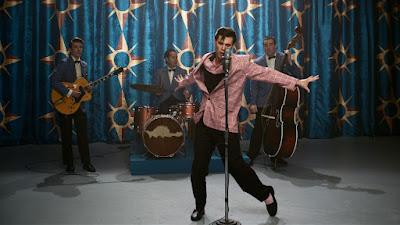Format: DVD from Sycamore Public Library on basement television.

This year’s Razzie nominations were interesting. While we frequently see a lot of famous names in mix, it’s not often that we see this many high-profile names in the mix. Tom Hanks has been nominated for both Worst Actor and Worst Supporting Actor for films from 2022, in the second case for Elvis, which also happens to be nominated for Best Picture. It’s an interesting situation, because it’s hard to overlook Tom Hanks in Elvis since, as Colonel Tom Parker, he narrates the story.
I have to admit that I went into this with a great deal of trepidation, not because it was about Elvis Presley (Austin Butler), about whom I am pretty ambivalent. It’s the length. Critic Mark Kermode, in his epic takedown of Sex and the City 2 commented that in 2001: A Space Odyssey, Stanley Kubrick took us from the birth of the human species to the birth of the next species in 2 hours and 29 minutes, while SatC 2 is 2 hours and 26 minutes and goes essentially nowhere. Elvis is 2 hours and 39 minutes.
For a film that is supposed to be a 2 ½ hour+ look at the life of Elvis, there are a few important and noteworthy things to say about it. The first is that it is in many respects much more about Colonel Tom Parker (Tom Hanks). Parker narrates for us, and while Elvis is often the subject of his narrative, it is from his own perspective, and we’re not going to ever stray too far from that. Since Parker was Dutch, this means we’re going to hear a lot of Hanks attempting a Dutch accent.
A second important and noteworthy thing is that Austin Butler as Elvis is a pretty, pretty man. It’s easy to remember the real Elvis in his final state, overweight, bloated and constantly on a concoction of pills, sweating and groaning through the same stage show just one more time. It’s easy to forget that in his youth, he was a good looking man. Butler pulls this off extremely well. Put him in a pink suit and hand him a guitar, and it’s not hard to see why the moral guardians of the time felt like he needed to be stopped.
The story that Elvis tells is a sort of Greek tragedy. In every great tragedy, the hero has a particular aspect of character that ends up causing his or her final death and destruction. For Elvis, as depicted by this film, that tragic flaw is his need to take care of everyone. Was that true? I don’t know for sure, but there is a ring of truth to it. According to the film, at least, Elvis felt it necessary to hire on his family, to supply them with money and gifts, and when it came down to it, to avoid dumping Col. Parker when it was clear that Parker was a crook. And that, again according to this film, is what eventually caused Elvis—that need to keep pushing and pushing, performing and performing, and making as much money as he could, half of which stopped for a few moments in Parker’s pocket before being funneled into slot machines.
Elvis is a very frustrating movie to watch. The best thing about the film by far is the performance from Austin Butler, which was the thing I was worried about the most. This is a career-making performance for Butler, who has been tapped to play Feyd-Rautha Harkonnen in the upcoming second Dune movie. He is magnetic on screen in this, and the film is less for it when someone else is even temporarily the focus.
Since Tom Parker is frequently the focus, this becomes a real problem at times. We get some of the details of the life of Elvis Presley, but surprisingly few of them. Elvis’s movie career is covered in about three minutes and then more or less ignored, for instance. Much of the film is so clearly done by Baz Luhrmann that it could not be mistaken for another director. Bluntly, that’s both a positive and a negative. Luhrmann is all about things being bigger than life and while that fits Elvis Presley, it doesn’t always fit the way the story is told. So much of what could be interesting here is hand waved. His one great love, Priscilla Presley (Olivia DeJonge), feels like she is barely in the movie before leaving.
The biggest problem that Elvis has is that it loses steam. It’s at its best when Elvis is young, lean, and hungry and looking to take on the world. Once we get into the later years of Elvis’s life, his time in Las Vegas, the breakup of his marriage to Priscilla, and the pills and drugs, the film really feels its length. The last hour of this is a lot longer than the first 90 minutes.
Ultimately, what this means is that Austin Butler deserves the nomination that he received for Best Actor, but Elvis shouldn’t be in the discussion when it comes to Best Picture. It’s a very good and very long performance from Butler surrounded by a lot of sound and fury that only demonstrates how good Butler really is.
Why to watch Elvis: Austin Butler is going to make a lot of people bi.
Why not to watch: It’s more about Tom Parker than it is about Elvis.
